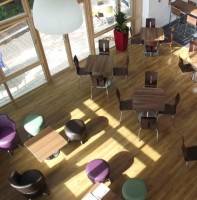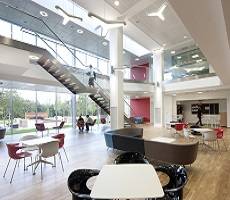November 9, 2013
Looking back on a year in which the office sought a clearer sense of identity
 It’s not often that workplace management becomes national business news but that happened at the end of February when the world became very interested for a while in the way we design and manage offices. The reason for this was the decision by Yahoo to ban homeworking for staff at its headquarters. The resultant period of shirt-rending at this challenge to received wisdom told us more about the changing view of the workplace than the actual decision by Yahoo. As the dust settled, we discovered that the Yahoo CEO Marissa Mayer had based her decision to change working practices on data from the company’s network that showed people working from home didn’t log on to the company Virtual Private Network as much as those in the office.
It’s not often that workplace management becomes national business news but that happened at the end of February when the world became very interested for a while in the way we design and manage offices. The reason for this was the decision by Yahoo to ban homeworking for staff at its headquarters. The resultant period of shirt-rending at this challenge to received wisdom told us more about the changing view of the workplace than the actual decision by Yahoo. As the dust settled, we discovered that the Yahoo CEO Marissa Mayer had based her decision to change working practices on data from the company’s network that showed people working from home didn’t log on to the company Virtual Private Network as much as those in the office.








 The finest closing sentence of any novel in my opinion is that in The Great Gatsby. “So we beat on, boats against the current, borne back ceaselessly into the past.” It is a reference to the futility of our attempts to escape the past, even as we look to the future, dreaming of how “tomorrow we will run faster, stretch out our arms farther”. F Scott Fitzgerald was referring to people when he wrote it, and Jay Gatsby in particular, but it’s a passage that resonates in a number of ways, especially in those areas of our lives that deal most intimately with what it means to be human. And one of these is self-evidently the workplace, where any articular attempt to define the ideal office for a particular time, including the future, is complicated by the fact that we must always meet the needs of the beasts that inhabit it. Regardless of the tools we have at our disposal with which to work more effectively, or just plain ‘more’ we remain fundamentally the same animals we were thousands of years ago.
The finest closing sentence of any novel in my opinion is that in The Great Gatsby. “So we beat on, boats against the current, borne back ceaselessly into the past.” It is a reference to the futility of our attempts to escape the past, even as we look to the future, dreaming of how “tomorrow we will run faster, stretch out our arms farther”. F Scott Fitzgerald was referring to people when he wrote it, and Jay Gatsby in particular, but it’s a passage that resonates in a number of ways, especially in those areas of our lives that deal most intimately with what it means to be human. And one of these is self-evidently the workplace, where any articular attempt to define the ideal office for a particular time, including the future, is complicated by the fact that we must always meet the needs of the beasts that inhabit it. Regardless of the tools we have at our disposal with which to work more effectively, or just plain ‘more’ we remain fundamentally the same animals we were thousands of years ago.
















November 13, 2013
Workplace Week highlights the changing shape of the office
by Richard Byatt • Comment, Events, Facilities management, Workplace design
‘High Street’ at Network Rail’s Milton Keynes base
This year’s Workplace Week which took place last week was a great success, with more people participating and more money raised for charity. Across the week, over 500 people took part, visiting innovative workplaces, attending the Workplace Week Convention or going along to one of the many Fringe events. Workplace Week is organised by Advanced Workplace Associates and supported by CoreNet Global, BCS, RICS, FMA and BIFM. All proceeds go to the Children in Need charity. Around 60 people joined the speakers at the headquarters of PWC on London’s Southbank for the Workplace Week Convention to discuss ‘Driving productivity through the connected organisation.’ The informal atmosphere and roundtable format encouraged participation, with a focus on developments in organisational design, change management and technology.
(more…)